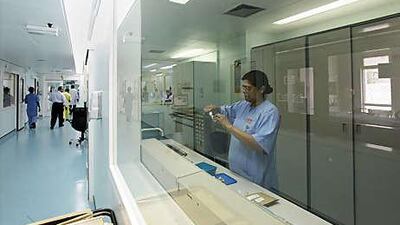DUBAI // For a hospital ward, security is tight. There are two burly, uniformed guards stationed at either side of the main entrance.
The door to this section of Rashid Hospital is sealed and protected by an alarm. Beyond it, patients are hurriedly guided left or right, depending on their sex. The patients are barely visible in their rooms, each separated from the corridor by not just one, but two sealed doors, with a sink in the space between. Around the walls, dozens of photographs and notices sternly instruct visitors and staff to use one of the many soap dispensers.
It is necessary. Because this is the infectious disease unit. As intimidating as it may seem, these precautions are essential to prevent the spread of some of the maladies treated here. The unit, which has been in operation for more than 25 years, admits about 600 patients each year for ailments ranging from leprosy and malaria to meningitis and HIV/Aids. "I remember when we saw the first case of HIV," recalls Elzy Mathew, a staff nurse.
"Everyone was a little worried, as we hadn't seen it before. Now it's just part of our normal work, we see it quite often." Because of the diversity of Dubai's population, and the country's role as a transit hub, diseases that have been eradicated in many other parts of the world are found in the emirate. Last year alone, patients with leprosy, typhoid and tetanus - diseases rarely seen in western hospitals - were treated in area hospitals.
Only last week, two rooms were occupied by young Asian men who had travelled into the country with leprosy, a contagious disease now largely confined to countries such as India and Bangladesh. The air pressure is kept low in all 22 rooms of the infectious disease unit; when the doors are opened, air flows in, but not out - an essential part of preventing cross-contamination. Outside the door of each occupied room is a either a yellow or red warning sign.
Yellow is "contact precaution" - indicating that the disease can be transferred only by physical contact. Red is "airborne precaution", for patients with a disease that can be transmitted via airborne methods. Of the 642 admissions to the unit in 2009,134 were for tuberculosis. Hepatitis (51 cases), viral meningitis and HIV (41 each) were also common. "Some patients come in with life-threatening infections," said Dr Laila al Dabal, who is one of the unit's head physicians.
"A severe form of meningitis, for example, can be both fatal and highly infectious. All infections involving the brain can be fatal." Thanks to regular, intensive hygiene training, not one staff member has been infected since the unit opened. The government-funded facility treats people regardless of nationality or residency status. Some have notifiable diseases, such HIV/Aids, leprosy, hepatitis and tuberculosis, meaning that their cases must be reported to governmental authorities. These patients are treated, then sent back to their home countries, along with a two weeks' supply of medication and a detailed medical report.
"By law we have to fully manage him to make sure he is in good shape to travel home," Dr al Dabal said. "We don't send sick people or people carrying active diseases home. It's a responsibility we take when we send them home." The unit is split into male and female wards, and a three-bed room is used to treat acute hepatitis only, as the disease is highly contagious. With some patients' stays lasting for months, it is important that they feel comfortable. "Being in hospital makes anybody stressed," said Nidal Abu Kabbah, the senior charge nurse. "Nobody is in a good psychological or emotional state because it's a new place.
"On an isolation ward you need a wonderful team. We take precautions without hurting the patients' feelings. "We wouldn't shake hands with them and immediately run and wash them, it's insensitive. You need to take sensible precautions without upsetting or worrying anyone." The unit usually operates at full or just under full capacity, and during an epidemic every room is occupied. "The ward was full during the H1N1 pandemic last year," Dr Dabal said. "There are certain times of year when things get busy."
When the first case of swine flu arrived in the UAE the patient was admitted to the infectious disease unit at Tawam Hospital, while Rashid's infections disease unit was put on standby. As it emerged that countries needed to concentrate on mitigating the effects rather than containing the disease, the unit only accepted patients who had been stopped in transit at Dubai airport. From May until December, 39 H1N1 cases were admitted to the unit. Most of the individuals had travelled from the US, Australia and Europe.
"We followed the right protocol," Mr Kabbah said. "We were here to treat the patients from the airport, but the best thing for everyone else was to go to their local health clinic. "When there are so many cases there is no point isolating anyone unless it is essential, like the transit passengers with nowhere to go." For Mr Kabbah, each patient is as important as the next, regardless of their disease or nationality. He understands the mentality of the patients and how lonely they can feel at times, especially if they do not have any visitors.
"We have the most wonderful team in the hospital and the way they communicate with the patients is great," he said. "You can't make them feel disgusted. Sometimes they need company, and all the staff are prepared to give that. "For everyone it's a challenging and rewarding job." munderwood@thenational.ae

